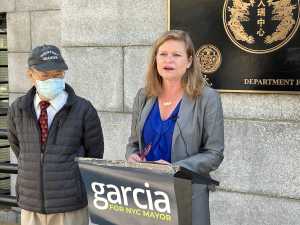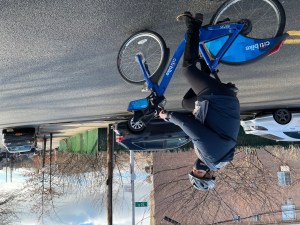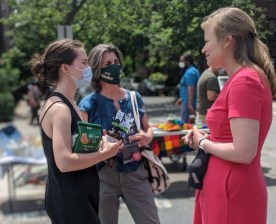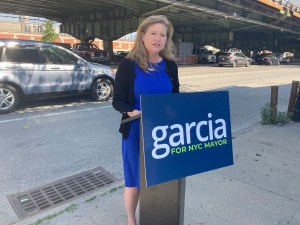Kathryn Garcia Slips on Marcia Kramer’s Bike-Licensing Banana Peel
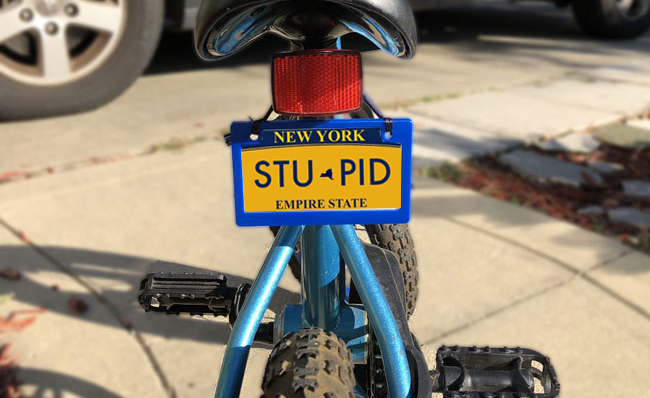
So much for the StreetsPAC bounce.
Just days after receiving the endorsement of the city’s only political action committee devoted to expanding cycling, Kathryn Garcia touched the bike advocacy world’s third rail at Thursday night’s mayoral debate and called for licensing of electric bike riders.
Under questioning from anti-cyclist CBS2 reporter Marcia Kramer, Garcia was the only one of the five candidates on stage who called for the restrictive measures against legal e-bikes, which many experts say would reduce cycling and make cyclists less safe.
“We’ve seen actual incredible usage of bikes during the pandemic, it’s the only part of our public transportation system that grew,” Garcia started. “But we are a really dense city, so for anything that is motorized – bikes, scooter, skateboard, whatever they’re motorizing – those need to have licenses.”
She then rejected Kramer’s suggestion that even regular human-powered bikes should be licensed.
“A license seems a barrier to what we want people to do because biking is the cleanest form of transportation,” Garcia said, reminding viewers of her pledge to build 250 miles of protected bike lanes in her first term.
Other candidates distanced themselves from Garcia’s answer.
Andrew Yang said there should only be licensing for e-bikes that “can go above a certain speed” (he did not define the speed, and of course no vehicles can legally exceed the city’s posted 25 mph limit), but Yang really put the blame for the perception of danger on the poor design of city roadways: “our infrastructure really isn’t set up for it [a bike boom].”
When Kramer persisted that cyclists should have license plates so that police can ticket them, Yang pointed out the obvious: cops have had no compunction about ticketing cyclists right now without license plates.
“I’ve actually received a ticket on a bicycle, and the lack of a plate on the back of it did not seem to keep this officer from issuing me a ticket,” Yang said of his “biking out of a bike lane” ticket, which he paid.
Maya Wiley dismissed Kramer’s question out of hand, saying, “The real issue here is that we have to do a better job of how we’re rebuilding this city and remaking it so that we can have more transportation alternatives that happen safely.”
On bike license plates, she was also clear: “The issue is not license plates; the issue is making sure that we’re creating more protected bike lanes.” She said her plan to create an “Office of Open Space Management” [she has previously used the term “Public Space Management”] would help create just such infrastructure.
Scott Stringer rejected license plates because, “I want to make sure we give high school students a free bike so they can get to school in a protected bike lane that I’ll initiate when I’m mayor.”
“We need to reimagine our streets, not just through the lens of open streets which I support, but we really have an opportunity to change the transportation culture in this city,” added Stringer. “That’s gonna help low wage workers, that’s gonna bring our city back to life, but I don’t think a licensing bureaucracy will do us well, especially for kids who will get caught up with policing and over-policing.”
Eric Adams followed that with a similar concern about over-policing, given that the NYPD has a well-documented racial bias in its enforcement of minor infractions.
“No, I wouldn’t license bikes,” Adams said. “As a kid I had to put my bikes together from spare parts, and young people, particularly in the inner city, don’t have the money to go down to license and registration [and] that opens the door for more unnecessary police interactions.”
He did say cyclists should abide by the rules, but he would do more to create a culture of safe cycling.
“Under an Eric Adams administration, three days a week children would ride to and from their school by having safe corridors,” he said. “We deal with childhood obesity, exercise, and also we can collaborate with each other in doing so, so I don’t believe in licensing, but I do believe we need to comply with the rules in the process.”
Streetsblog reached out to StreetsPAC for comment and was sent the following statement from Executive Director Eric McClure:
It seems that Commissioner Garcia perhaps phrased her answer to a typical Marcia Kramer, preserve-the-driving-status-quo, gotcha-style question in a way that didn’t convey what she intended. She has not talked about licensing anywhere in her platform, in any discussions we’ve had with her, or anywhere else written or oral, to our knowledge, and it doesn’t appear to reflect any of her crystallized, progressive policy views.
As e-bikes and other newer electrified micro-mobility modes continue to increase in popularity, there will be growing pains and an ongoing dialogue and policy push-and-pull as we integrate them into the everyday mix on the city’s streets. No jurisdiction nationally or internationally that we know of has ever seriously attempted a DMV-style licensure or registration regime for low-speed, lightweight, two-wheeled vehicles, and we certainly don’t expect New York City will be the first. Commissioner Garcia is a data-driven executive, and we’re confident that were she to take a close look at the data on the effect that this type of regulation has on suppressing ridership, she would not conclude that it would be something her administration would pursue. She’s been clear that she has no interest in shifting bike (or scooter or skateboard) trips to car trips.
I should also point out that no mayor (including Mayor Bloomberg and certainly not Mayor de Blasio) has ever given as full-throated a critique of private motor vehicle use, or as wholehearted an endorsement of cycling, as Kathryn Garcia gave at the debate last night.
Kramer has long been obsessed with supposedly reckless cyclists, despite city data showing very few crashes involving cyclists and virtually all city injuries being caused by car or truck drivers.
Still, her question does come in the context of a growing backlash to electric bike riders, specifically the fastest ones preferred by delivery workers — whose livings depend on speed and whose far-flung assignments are chosen by their delivery companies.
At the same time, there is a boom in all manner of cycling, and the construction of bike lanes has not kept pace, as all of the candidates (but not their inquisitor) acknowledged.
Last week, an Upper West Side community board panel called for a full ban of all e-bikes, including Citi Bike pedal-assist bikes, from bike lanes — an idea outright dismissed by Mayor de Blasio.
When a member of the board’s transportation committee suggested a safer plan of action than a ban — i.e. building more and wider bike lanes — the motion was rejected.

